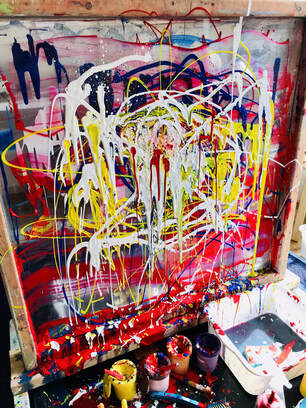About Creative Arts Therapy
 Creative expression gives us space to process more deeply.
Creative expression gives us space to process more deeply.
Creative Arts Therapies include Drama Therapy, Art Therapy, Music Therapy and Dance/Movement Therapy. I have experience in each of these modalities, completing my Master of Arts in Creative Arts Therapies, specializing in Drama Therapy. The Creative Arts Therapies are beneficial to people of all ages (children aged 3-103!) seeking to learn more about themselves, their relationships, their thoughts, feelings, and experiences, and to gain access to their inner wisdom and healing through creative methods.
Creative Arts Therapy is powerful in person, but also easily adapted to a virtual format. There are many benefits of creative expression for coping with every day life stressors as well as the more complex experiences we may face. Engaging in the Arts give us a place to express, decompress, make sense of, meditate, process, regulate and imagine a better future within the ever present now.
What is Drama Therapy?
The North American Drama Therapy Association (NADTA) states that: "Drama therapy is the intentional use of drama and/or theater processes to achieve therapeutic goals. Drama therapy is active and experiential. This approach can provide the context for participants to tell their stories, set goals and solve problems, express feelings, or achieve catharsis. Through drama, the depth and breadth of inner experience can be actively explored and interpersonal relationship skills can be enhanced."
What is Involved?
Drama therapy is the skillful use of drama and methods from theatre by an accredited drama therapist to promote, maintain, and restore mental, physical, emotional, and spiritual health. Theatre processes such as improvisation, role play, character exploration, masks, and performance offer a creative outlet for expression. These nonverbal, creative, and emotional qualities are used in the therapeutic relationship to facilitate contact, interaction, self-awareness, learning, self-expression, communication, and personal development.
Creative Arts Therapy is powerful in person, but also easily adapted to a virtual format. There are many benefits of creative expression for coping with every day life stressors as well as the more complex experiences we may face. Engaging in the Arts give us a place to express, decompress, make sense of, meditate, process, regulate and imagine a better future within the ever present now.
What is Drama Therapy?
The North American Drama Therapy Association (NADTA) states that: "Drama therapy is the intentional use of drama and/or theater processes to achieve therapeutic goals. Drama therapy is active and experiential. This approach can provide the context for participants to tell their stories, set goals and solve problems, express feelings, or achieve catharsis. Through drama, the depth and breadth of inner experience can be actively explored and interpersonal relationship skills can be enhanced."
What is Involved?
Drama therapy is the skillful use of drama and methods from theatre by an accredited drama therapist to promote, maintain, and restore mental, physical, emotional, and spiritual health. Theatre processes such as improvisation, role play, character exploration, masks, and performance offer a creative outlet for expression. These nonverbal, creative, and emotional qualities are used in the therapeutic relationship to facilitate contact, interaction, self-awareness, learning, self-expression, communication, and personal development.
"Under the guise of play and pretend, we can - for once - act in new ways. The bit of distance from real life afforded by drama enables us to gain perspective on our real-life roles and patterns and actions, and to experiment actively with alternatives."
-- Renee Emunah, PhD, RDT/BCT
Director, Drama Therapy Program, California Institute of Integral Studies
"Unlike talk therapy, drama therapy gets there really fast. Role-playing -acting out issues and problems - is more effective than talking."
-- Robert Landy, PhD, RDT/BCT
Director Drama Therapy Program, New York University
